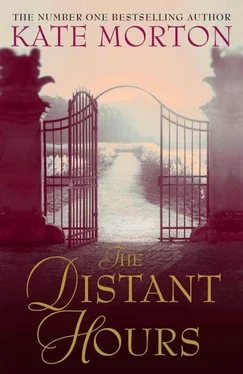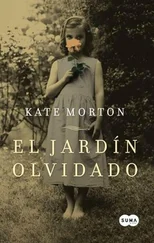‘Why is that?’
‘They all face north.’
Percy had a pared way of speaking; a little like the way wireless commentators used to sound, back when the BBC was the last word on all matters enunciative. Short sentences, perfect diction, the hint of nuance concealed in the body of each full stop. ‘The heating in winter is impossible,’ she said. ‘It’s just the three of us so we hardly need the space. It was easier to close some doors for good. My sisters and I took rooms in the small west wing; near the yellow parlour.’
‘That makes sense,’ I said quickly. ‘There must be a hundred rooms in a building this size. All the different levels – I’d be sure to get lost.’ I was babbling, I could hear it but I couldn’t stop it. A basic lack of facility with small talk, excitement at finally being inside the castle, lingering discomfort from the scene with Juniper… whatever, it proved a lethal combination. I drew a deep breath and, to my horror, continued: ‘Though of course you’ve been here all your life so I’m sure it’s not a problem for you-’
‘I’m sorry,’ she said sharply, turning to face me. Even in the gloom I could see that her skin had whitened. She’s going to ask me to leave , I thought; my visit is too much, she’s old and tired, her sister isn’t well .
‘Our sister isn’t well,’ she said and my heart plunged. ‘It has nothing to do with you. She can be rude sometimes, but it isn’t her fault. She suffered a great disappointment – a terrible thing. A long time ago.’
‘There’s no need to explain,’ I said. Please don’t ask me to leave.
‘Very kind, but I feel I must. At least a little. Such rudeness. She doesn’t do well with strangers. It’s been an awful trial. Our family physician died a decade ago and we’re still battling to find another we can tolerate. She gets confused. I hope you don’t feel unwelcome.’
‘Not at all, I understand completely.’
‘I hope so. Because we’re very pleased you could visit.’ That short hairpin smile. ‘The castle likes to be visited; it needs it.’
Caretakers in the Veins
On the morning of my tenth birthday, Mum and Dad took me to visit the dolls’ houses at the Bethnal Green Museum. I don’t know why we went to see dolls’ houses, whether I’d expressed an interest or my parents had read a newspaper article about the collection, but I remember the day very clearly. One of those few shining memories you gather along the way; perfectly formed and sealed, like a bubble that forgot to pop. We went in a taxi, which I remember thinking very posh, and afterwards we had tea at a fancy place in Mayfair. I even remember what I wore: a diamond-patterned mini-dress I’d coveted for months and finally unwrapped that morning.
The other thing I remember with blinding clarity is that we lost my mum. Perhaps that event, rather than the dolls’ houses themselves, is why the day didn’t fade for me when it was tossed in amongst the crushing constellation of childhood experiences. It was all topsy-turvy, you see. Grown-up people didn’t get lost, not in my world: it was the province of children, of little girls like me who made a habit of following their daydreams and dragging their feet and generally Failing to Keep Up.
But not this time. This time, inexplicably, earth joltingly, it was my mum who’d slipped through the cracks. Dad and I were waiting in a queue to buy a souvenir booklet when it happened; we were shuffling forward, following the line, each of us keeping silent company with our own thoughts. It wasn’t until we reached the counter and both stood mutely, blinking first at the shop assistant, then at one another, that we realized we were somehow without our traditional family mouthpiece.
I was the one to find her again, kneeling in front of a doll’s house we’d already passed. It was tall and dark, as I recall, with lots of staircases, and an attic running along the top. She didn’t explain why she’d returned, saying only, ‘There are actual places like this, Edie. Real houses with real people living in them. Can you imagine? All those rooms?’ A twinge at the edge of her lips and she continued, the soft, slow lilt of recitation: ‘ Ancient walls that sing the distant hours .’
I don’t think I answered her. For one thing there wasn’t time – my dad turned up right then looking flustered and somehow personally wounded – and for another I wasn’t sure what to say. Although we never discussed it again, it was a long time before I let go completely of the belief that somewhere out there in the great, wide world, stood real houses with real people living in them and walls that sang.
I mention the Bethnal Green Museum here only because, as Percy Blythe led me down darkening corridors, Mum’s comment came back to me, bright and brighter, until I could see her face, hear her words, as clearly as if she were standing right next to me. It might have had something to do with the odd sense that pressed upon me as we explored the enormous house; the impression that I’d fallen victim somehow to a shrinking spell and been transported inside a house for dolls, albeit a doll’s house that was rather down at heel. One whose child owner had grown beyond the point of interest and moved on to new obsessions, leaving the rooms with their faded wallpapers and silks, the rush-matted floors, the urns and stuffed birds, the heavy furniture waiting silently, hopefully, for reoccupation.
Then again, perhaps all that came second. Perhaps it was Mum’s comment that came to mind first because of course she’d been thinking of Milderhurst when she’d told me about the real people in their real houses with lots of rooms. What else could have inspired her to say such a thing? That unreadable expression on her face had been the result of remembering this place. She’d been thinking about Percy, Saffy and Juniper Blythe and the strange, secret things that must have happened to her as a girl when she was transplanted from south London to Milderhurst Castle. The things that had reached across fifty years with a grasp strong enough that a lost letter could make her cry.
Whatever the case, as I took Percy’s tour that morning, I carried my mum with me. I couldn’t have resisted her if I’d tried. No matter that I’d become inexplicably jealous that my exploration of the castle be my own – a small part of Mum, a part I’d never known, certainly never noticed, was anchored to this place. And although I wasn’t used to having things in common with her, although the very notion made the earth spin a little faster, I realized that I didn’t mind. In fact, I rather liked that the curious comment at the doll’s house museum was no longer an oddity, a mosaic piece that didn’t fit the whole. It was a fragment of Mum’s past, a fragment that was somehow brighter and more interesting than those surrounding it.
So it was, as Percy led, and I listened and looked and nodded, that a small ghostly Londoner stepped silently beside me: wide-eyed, nervous, glimpsing the house for the first time, too. And it turned out I liked her being there; if I could’ve, I’d have reached down across the decades to take her hand in mine. I wondered how different the castle must have been in 1939, how much change had occurred in the past fifty years. Whether even then Milderhurst Castle had felt like a house asleep, everything dull and dusty and dim. An old house biding its time. And I wondered whether I’d have the chance to ask that little girl, if she was still at large somewhere. If I’d ever be able to find her.
It is impossible to recount everything that was said and seen that day at Milderhurst, and, for the purposes of this story, unnecessary. So much has happened since, subsequent events have bowed and bent and mixed in my mind so that it’s difficult to isolate my first impressions of the castle and its inhabitants. I will stick, then, in this account, to the sights and sounds that were most vivid, and to those events pertinent to what came after, and what came before. Events that could never – will never – fade from memory.
Читать дальше












